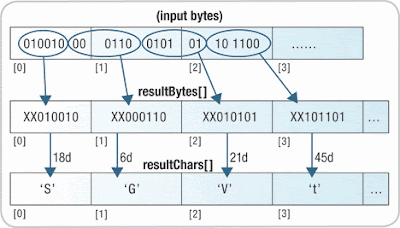

The only drawback is that the size of the result will increase to 33. Yeah, that’s right, 64 characters is enough to encode any data of any length. This notice may not be removed or altered from any source distribution. Base64 is an encoding mechanism which was originally made for encoding binary. The Base64 Alphabet contains 64 basic ASCII characters which are used to encode data.

Misrepresented as being the original source code.ģ. Altered source versions must be plainly marked as such, and must not be In a product, an acknowledgment in the product documentation would beĢ.
Base64 encoding table code#
The origin of this source code must not be misrepresented you must notĬlaim that you wrote the original source code. In computer programming, Base64 is a group of binary-to-text encoding schemes that represent binary data in sequences of 24 bits that can be represented by. Including commercial applications, and to alter it and redistribute itįreely, subject to the following restrictions:ġ.
Base64 encoding table software#
Permission is granted to anyone to use this software for any purpose, In no event will the author be held liable for any damages This source code is provided 'as-is', without any express or implied Putting the code below in case the site goes down: There are just three steps to follow: Get the QR data stored in Hexadecimal value (RAWSTRING) from table EDOSINV Convert this value to String value.
Base64 encoding table download zip#
Neo23x0 / Base64CheatSheet.md Last active 13 hours ago Star 227 Fork 37 Code Revisions 60 Stars 227 Forks 37 Download ZIP Learning Aid - Top Base64 Encodings Table Raw Base64CheatSheet. base32 - Base32 encode/decode data and print to standard output. None of answers satisfied my needs, I needed simple two-function solution for encoding and decoding, but I was too lazy to write my own code, so I found this: Learning Aid - Top Base64 Encodings Table GitHub Instantly share code, notes, and snippets. I needed C++ implementation working on std::string. Printf("Base-64 decoded string is: %s\n", base64_decoded) //Prints base64 decoded string.įree(base64_encoded) //Frees up the memory holding our base64 encoded data.įree(base64_decoded) //Frees up the memory holding our base64 decoded data. Printf("Base-64 encoded string is: %s\n", base64_encoded) //Prints base64 encoded string. Printf("Original character string is: %s\n", data_to_encode) //Prints our initial string. Basically, Base64 is a collection of related encoding designs which represent the binary information in ASCII format by converting it into a base64 representation. Int bytes_to_decode = strlen(base64_encoded) //Number of bytes in string to base64 decode.Ĭhar *base64_decoded = base64decode(base64_encoded, bytes_to_decode) //Base-64 decoding. Int bytes_to_encode = strlen(data_to_encode) //Number of bytes in string to base64 encode.Ĭhar *base64_encoded = base64encode(data_to_encode, bytes_to_encode) //Base-64 encoding. *Here's one way to base64 encode/decode using the base64encode() and base64decode functions.*/Ĭhar data_to_encode = "Base64 encode this string!" //The string we will base-64 encode. Return base64_decoded //Returns base-64 decoded data with trailing null terminator. This ensures that the data remains intact without modification during transport.Static char encoding_table = //Once we're done reading decoded data, BIO_read returns -1 even though there's no error.īIO_free_all(b64_bio) //Destroys all BIOs in chain, starting with b64 (i.e. Base64 Encoding Table Solving the Endgame Base64 encoding is a process of converting binary data to an ASCII string format by converting that binary data into a 6-bit character representation. When the term "Base64" is used on its own to refer to a specific algorithm, it typically refers to the version of Base64 outlined in RFC 4648, section 4, which uses the following alphabet to represent the radix-64 digits, alongside = as a padding character: ABCDEFGHIJKLMNOPQRSTUVWXYZabcdefghijklmnopqrstuvwxyz0123456789+/Ī common variant is "Base64 URL safe", which omits the padding and replaces +/ with -_ to avoid characters that might cause problems in URL path segments or query parameters.īase64 encoding schemes are commonly used to encode binary data for storage or transfer over media that can only deal with ASCII text (or some superset of ASCII that still falls short of accepting arbitrary binary data). The term Base64 originates from a specific MIME content transfer encoding.


 0 kommentar(er)
0 kommentar(er)
